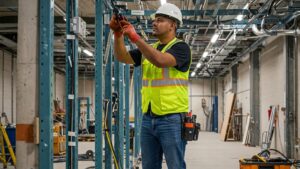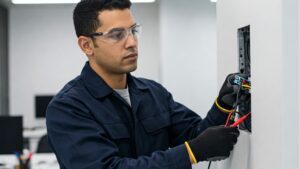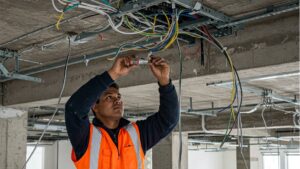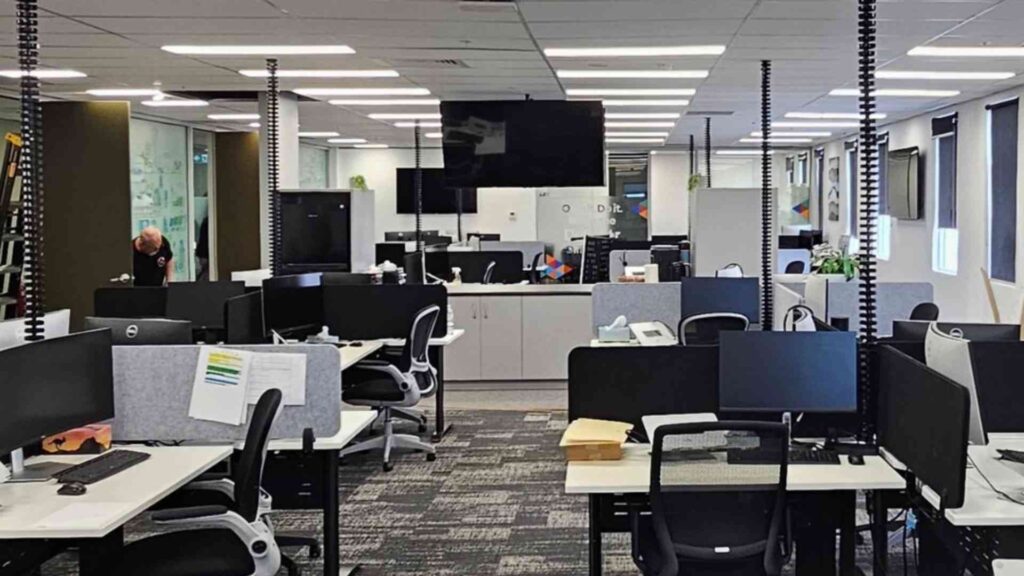The daily reality of electrician working encompasses far more than most people realize. From residential repairs to complex industrial installations, electrical technician involves a diverse range of skills, knowledge, and safety considerations. This in-depth exploration examines what electrical technician truly entails, the various specializations within the field, and how these professionals power our modern world.

Understanding the Scope of Electrician Working
Electrician working covers a broad spectrum of electrical services across multiple environments. Residential electrical technician typically involves installing and maintaining electrical systems in homes, including wiring, lighting, and safety devices. Commercial electrical technician focuses on larger-scale projects in office buildings and retail spaces, often involving Commercial Data Cabling and more complex power distribution systems.
Industrial electrical technician deals with high-voltage equipment, machinery, and control systems in manufacturing plants and factories. These specialists often collaborate with Controls Electrician professionals to maintain automated production lines. Regardless of the setting, all electrician working must adhere to strict safety standards and electrical codes to prevent accidents and ensure reliable system performance.
Daily Responsibilities in Electrician Working
A typical day of electrical technician might begin with reviewing job specifications and blueprints for a new installation project. The electrician then gathers necessary tools and materials before traveling to the worksite. Upon arrival, safety checks are performed to identify potential hazards before any electrical technician begins.
Installation tasks form a major part of electrical technician, whether running new circuits, installing lighting fixtures, or setting up electrical panels. Precision measurements and calculations ensure proper load balancing and circuit protection. For specialized projects like installing a Power Factor Correction Device, additional training and expertise are required.
Troubleshooting electrical problems consumes a significant portion of electrician working time. Using specialized testing equipment, electricians diagnose issues ranging from simple switch failures to complex system malfunctions. Problem-solving skills are essential in this aspect of electrical technician, as symptoms often don’t directly reveal their underlying causes.
Specialized Areas of Electrician Working
The field of electrical technician includes several specialized areas that require additional training and certification. Office Electrician Sydney professionals focus on commercial office environments, addressing unique needs like workstation power distribution and emergency lighting systems. Their electrical technician often integrates with IT infrastructure and data networks.
Industrial electrician working specialists handle high-voltage systems, motor controls, and production equipment in factories. These professionals often provide Industrial Electrician Services that keep manufacturing operations running smoothly. Their work frequently involves maintaining three-phase power systems and troubleshooting complex machinery.
Maintenance electrical technician focuses on preventative care and system longevity. These professionals perform regular inspections, thermal imaging scans, and electrical testing to identify potential issues before they cause failures. Their proactive approach to electrical technician helps prevent costly downtime and safety hazards.
Safety Protocols in Electrician Working
Safety forms the foundation of all professional electrical technician practices. Before beginning any task, electricians must identify potential hazards and implement appropriate controls. Lockout/tagout procedures ensure equipment is de-energized before electrical technician begins, preventing accidental shocks or arc flashes.
Personal protective equipment (PPE) is mandatory for most electrician working situations. This includes insulated gloves, safety glasses, flame-resistant clothing, and sometimes arc-flash suits for high-voltage work. Proper tool use is another critical safety aspect, with insulated tools required for many electrical technician tasks.
Fall protection measures are essential when electrician working at heights, such as installing lighting in warehouses or working on electrical panels mounted high on walls. Safety harnesses, guardrails, and proper ladder use help prevent falls that could cause serious injuries.
Tools and Equipment for Electrician Working
Professional electrical technician requires an extensive array of specialized tools. Basic hand tools like pliers, screwdrivers, and wire strippers are used daily, while power tools like drills and saws help with installation tasks. Testing equipment forms another critical category, including multimeters, circuit testers, and insulation resistance testers.
Advanced electrician working often involves thermal imaging cameras to detect hot spots in electrical systems, as well as harmonic analyzers for power quality assessment. For data and communications work, cable testers and toners help verify proper installation of Commercial Data Cabling systems.
Vehicle equipment is another consideration for electrical technician professionals. Service vans are typically stocked with common materials and parts to minimize trips to suppliers, along with ladders and other access equipment needed for various job sites.

Training and Certification Requirements
Becoming a professional electrician working specialist requires extensive training and certification. Apprenticeship programs typically combine classroom instruction with on-the-job training under licensed electricians. This hands-on approach to learning electrical technician skills ensures both theoretical knowledge and practical ability.
Licensing requirements vary by location but generally involve passing examinations that test knowledge of electrical theory, codes, and safety practices. Continuing education is often required to maintain licenses, keeping electrician working professionals current with evolving technologies and code changes.
Specialized certifications are available for various aspects of electrical technician, including industrial controls, renewable energy systems, and safety protocols. These additional qualifications allow electricians to expand their service offerings and take on more complex projects.
Challenges in Modern Electrician Working
The field of electrical technician faces several evolving challenges in today’s technological landscape. Increasingly complex electrical systems require continuous learning to stay current with new technologies. Smart building systems, renewable energy integration, and advanced controls all impact how electrician working is performed.
Physical demands present another challenge in electrician working. The profession often requires working in uncomfortable positions, handling heavy materials, and spending long hours on one’s feet. These demands make proper ergonomics and physical fitness important considerations for career longevity.
Safety risks remain an ever-present challenge in electrical technician, despite significant advances in protective equipment and procedures. Electricians must maintain constant vigilance against electrical shocks, arc flashes, and other workplace hazards that could cause serious injury.
The Business Side of Electrician Working
Many electrical technician professionals eventually establish their own businesses, adding managerial responsibilities to their technical skills. Estimating and quoting jobs requires understanding material costs, labor requirements, and potential challenges that could impact project timelines.
Customer service skills are equally important in electrician working, as electricians must communicate technical information clearly to non-technical clients. Building long-term relationships often leads to repeat business and referrals, which are vital for sustaining an electrical technician business.
Scheduling and logistics form another key aspect of professional electrical technician. Efficient routing between job sites, coordinating with suppliers, and managing apprentice electricians all contribute to business success.
Future Trends Impacting Electrician Working
Several emerging trends are shaping the future of electrical technician. Renewable energy systems like solar arrays and battery storage require new skills for installation and integration with existing electrical systems. Electricians must adapt their electrician working practices to accommodate these technologies.
Smart home and building automation systems are creating demand for electrical technician professionals who understand both power and data systems. The convergence of these technologies requires electricians to expand their knowledge beyond traditional electrical work.
Energy efficiency initiatives are driving changes in electrician working practices as well. From installing energy monitoring systems to implementing advanced lighting controls, electricians play a key role in helping clients reduce power consumption.

Choosing Professional Electrician Services
When selecting an electrician working professional for your needs, several factors should be considered. Verify that the electrician holds current licensing and insurance, which are essential for both quality work and liability protection. Experience with similar projects is another important consideration, as electrical technician requirements vary significantly between residential, commercial, and industrial settings.
Reputation and references provide valuable insight into an electrician’s reliability and work quality. Companies like Lightspeed Electricals with established track records often provide more consistent results than unproven providers. Clear communication and professionalism should be evident from initial contacts, as these qualities typically carry through to the electrician working itself.
Conclusion: The Vital Role of Electricians
The profession of electrician working remains essential to modern life, powering our homes, businesses, and industries. From basic repairs to complex installations, these skilled professionals ensure our electrical systems operate safely and reliably. The diverse nature of electrical technician offers numerous career paths, from residential service to specialized industrial applications.
As technology continues evolving, the field of electrician working will adapt to incorporate new systems and methods. Electricians who embrace continuous learning and maintain rigorous safety standards will find abundant opportunities in this essential trade. Whether you need Commercial Electrician Services or residential electrical work, professional electricians provide the expertise to keep your systems functioning optimally.


